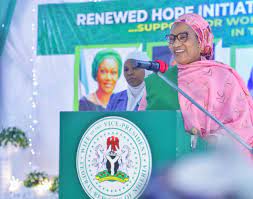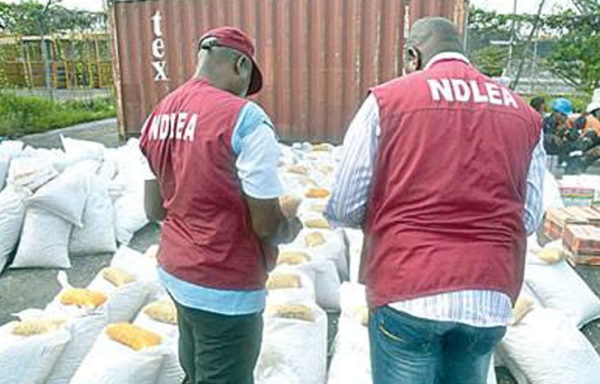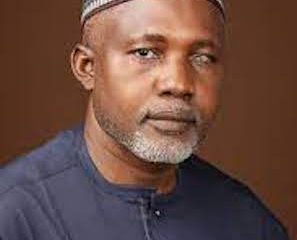Economy
Centre Partners NGO on Rural Women Empowerment

The National Centre for Women Development (NCWD) says it is collaborating with Peace Advocacy and Community Development Initiative (PACDIN), an NGO, to empower rural women on accessing Micro-finance loans in the country.
The Director-General of the Centre, Mrs Mary Ekpere-Eta, disclosed this while briefing newsmen on Friday in Abuja, ahead of a three-day workshop on Rural Women Transformation and Entrepreneurship Development.
Ekpere-Eta, represented by the Director, Training and Development, Hajiya Mainuma Yangora, said the workshop would equip rural women on small and medium enterprises, and on ways of accessing loans under various government schemes.
“The workshop is to re-position women to take advantage of the numerous generous financial policies of the present administration, in its next bid and agenda to lift up over 100 million Nigerians out of poverty.”
She noted that the centre had also notified state Ministries of Women Affairs, wives of governors, local government chairmen and other stakeholders to mobilise more participants for the workshop.
In a related development, the NCWD chief commended President Muhammadu Buhari for nominating women in his cabinet, calling for the appointment of more women on the boards of federal agencies and state government offices.
The theme of the workshop is :“Rural Women and Youths Accessibility of Micro-finance Facility for Rural SMEs, Development and Growth in Nigeria”.
The workshop holds from July 26 to July 31 in Abuja. (NAN)
Business News
CBN Unveils Strategy to Boost Remittances, Grants AIP To 14 New IMTOs

By Tony Obiechina, Abuja
The Central Bank of Nigeria (CBN) has activated plans to double foreign-currency remittance flows through formal channels by granting 14 new International Money Transfer Operators (IMTOs) Approval-in-Principle (AIP).
This was disclosed in Abuja on Wednesday, by the Bank’s Acting Director of Corporate Communications, Mrs.
Hakama Sidi Ali, who stated that the initiative will help increase the sustained supply of foreign exchange in the official market by promoting greater competition and innovation amongst IMTOs to lower the cost of remittance transactions and boost financial inclusion.She said, “This will spur liquidity in Nigeria’s Autonomous Foreign Exchange Market (NAFEX), augmenting price discovery to enable a market-driven fair value for the naira.
“It will be recalled that the CBN Governor, Mr. Olayemi Cardoso, had recently declared: “We’ve set ourselves a target to double remittance flows into Nigeria within a year, a goal I firmly believe is within reach.
“We are wasting no time driving progress to remove any bottlenecks hindering flows through formal channels permanently. We have a determined pathway and a sequenced approach to tackling all challenges ahead, working hand in hand with key stakeholders in the remittance industry,” she stated.
Continuing, Sidi Ali, said that the CBN viewed increasing formal remittance flows—one of the major sources of foreign exchange, accounting for over 6% of GDP—as a means of reducing the historical volatility in Nigeria’s exchange rate caused by external factors, such as fluctuations in foreign investment and oil export proceeds.
The increase in the number of IMTOs is one of the primary actions initiated by the CBN’s remittance task force, overseen by Governor Cardoso as a collaborative unit pulling together specialists to work closely with the private sector and market operators to facilitate the ease of doing business in the remittance ecosystem in Nigeria.
The task force was established as a direct result of an executive learning session with IMTOs during the World Bank/IMF Spring Meetings held in Washington DC, United States of America, in April 2024. The task force will meet regularly to implement strategy and monitor the impact of its measures on remittance inflows.
Economy
FG Vows To Ensure Continuous Flow of Tax Revenue – Madein
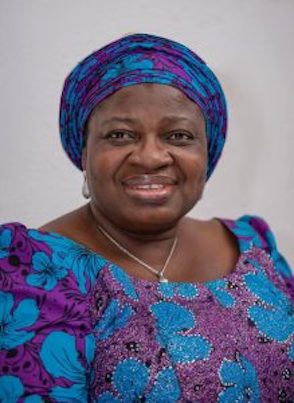
By Tony Obiechina, Abuja
The Federal government is committed a tax culture that will ensure the continuous flow of revenues into government coffers, the Accountant General of the Federation, Dr Oluwatoyin Madein has said.
Madein stated this at the 26th Annual Tax Conference of the Chartered Institute of Taxation of Nigeria (CITN) in Abuja, with the theme: “Sustainable Tax Culture and Economic Roadmap for Nation Building”.
Madein said, “Like the CITN, the Office of the Accountant-General of the Federation is committed to a sustainable tax culture that will ensure the continuous flow of revenues even at an improved level.
“Tax revenue as at today is the highest source of revenue accruing to the federation.
Therefore at the Federation Account Allocation Committee meetings we eagerly await the numbers coming from the FIRS because the performance keeps on increasing and brings succour to all tiers of government.”She charged tax practitioners to work harder in getting more revenue from taxes, stressing that tax revenue is currently the highest income source for the federation.
The government noted that based on the current high revenue from taxes, members of the Federation Accounts Allocation Committee were always looking forward to the figures from the Federal Inland Revenue Service every month, in order to have funds to share to the three tiers of government.
“Tax revenue as at today is the highest source of revenue accruing to the federation. Therefore at the Federation Account Allocation Committee meetings we eagerly await the numbers coming from the FIRS because the performance keeps on increasing and brings succour to all tiers of government”, she added.
FIRS exceeded its 2023 revenue target by N816bn, as its total actual revenue collection for last year stood at N12.37tn, outperforming the N11.56tn target.
This is contained in a presentation by Amina Ado, Coordinating Director of Special Tax Operations Group at the FIRS.
The accountant-general tasked tax practitioners to step up efforts in collecting taxes, so as to shore up more revenue for the government to provide infrastructure and other amenities.
Madein said, “Let us remain steadfast in our commitment to building a better future for all. Together we can harness the transformative power of taxation to create a more prosperous, equitable and sustainable world.
“Like I said earlier, at FAAC we eagerly look forward to tax numbers because at the moment revenue from non-oil has been a great revenue source to the federation.
“Therefore, to tax practitioners, you are doing so well, but we need more of this to be able to deliver on all the areas that the citizens are looking forward to, because for even infrastructure development, it is only through funds that we can get it done.”
She further stated that it was her strong belief that “the conference will go a long way to deepen the collaboration between our organisations in building capacity for all the professionals, experts and tax payers for better understanding of the tax laws, rules and regulations.”
In his remarks, the President/Chairman of Council, CITN, Samuel Agbeluyi, pointed out that the withdrawal of subsidies on fuel and electricity had reduced the purchasing power of the masses.
He noted that raising electricity tariff for a selected band after fuel subsidy was withdrawn “is going to reduce the purchasing power of the masses. So we urge govt to consider these actions on the masses.
He, however, stated that the institute was happy to know that President Bola Tinubu had asked the Central Bank of Nigeria to slow down on the recent cybersecurity levy that was approved by the apex bank.
“We will continue to advise the govt on its policies, considering how these polices affect the citizens,” Agbeluyi stated.
Economy
Access Holdings Awards Shares Worth N427.13m to 8 Senior Executives
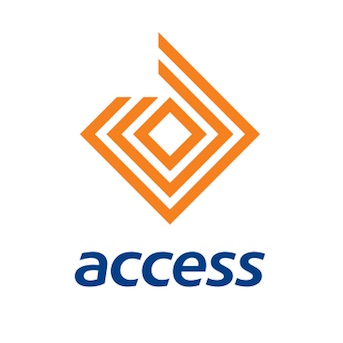
Access Holdings Plc has awarded 23.8 million ordinary shares worth N427.13 million to its senior executives and those of its subsidiary, Access Bank.
This was disclosed in a notice sent to the Nigerian Exchange Ltd.(NGX) in Lagos.
The notification was sent in line with the disclosure requirements of the Securities and Exchange Commission (SEC) and the NGX.
It is also in pursuant of the terms of its shareholders’ approved Employees Performance Share Plan.
The group said that Ms Bolaji Agbede, Acting Group Chief Executive Officer, Access Holdings, Mr Roosevelt Ogbonna, Managing Director/CEO, Access Bank, and six others were vested with 23,883,790 shares worth N427.
13 million in total.According to the filings, Ogbonna got the highest amount of shares, totalling 12,345,679 and valued at N220.37 million, having been traded at N17.85 per share.
Agbede was vested with 2,216,992 shares, valued at N39.795 million.
Other directors who had shares vested on them include: Mr Seyi Kumapayi, Executive Director, African Subsidiaries, Access Bank, with 1,234,568 shares worth N22.16 million.
Ms Iyabo Soji-Okusanya, Executive Director, Commercial and Investment Banking Division, Access Bank, got 1,691,308 shares at N17.95 per share, valued at N30.36 million.
Mrs Chizoma Okoli, Access Bank’s Deputy Managing Director, Retail South, also got 1,728,395 shares valued at N30.85 million.
Dr Gregory Jobome, Executive Director, Risk Management, and Hadiza Ambursa, Executive Director, Commercial Banking, were vested with 1,728,395 shares each,valued at N30.85 million and N31.02 million respectively.
Also, Access Holdings’ Company Secretary, Mr Sunday Ekwochi, was vested with 1,210,058 shares worth N21.72 milion.
The group stated that the shares were vested on May 3 and May 6.
It noted that the vesting of the shares was not a purchase or sale transaction in the context of the Exchange’s rules.(NAN)






